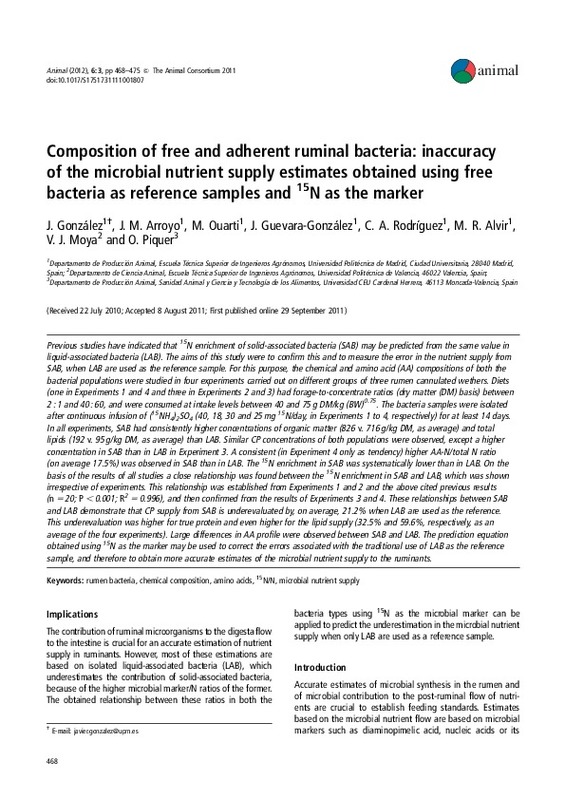González, J.; Arroyo, J.; Ouarti, M.; Guevara-González, J.; Rodríguez, C.; Alvir, M.; Moya Salvador, VJ.... (2012). Composition of free and adherent ruminal bacteria: inaccuracyof the microbial nutrient supply estimates obtained using freebacteria as reference samples and 15N as the marker. Animal. 6(3):468-475. https://doi.org/10.1017/S1751731111001807
Por favor, use este identificador para citar o enlazar este ítem: http://hdl.handle.net/10251/27815
|
Título:
|
Composition of free and adherent ruminal bacteria: inaccuracyof the microbial nutrient supply estimates obtained using freebacteria as reference samples and 15N as the marker
|
|
Autor:
|
González, J
Arroyo, J.M.
Ouarti, M
Guevara-González, J.
Rodríguez, C.A.
Alvir, M.R.

 Moya Salvador, Vicente Javier
Piquer Querol, Olga
Moya Salvador, Vicente Javier
Piquer Querol, Olga
|
|
Entidad UPV:
|
Universitat Politècnica de València. Departamento de Ciencia Animal - Departament de Ciència Animal
|
|
Fecha difusión:
|
|
|
Resumen:
|
Previous studies have indicated that 15N enrichment of solid-associated bacteria (SAB) may be predicted from the same value in liquid-associated bacteria (LAB). The aims of this study were to confirm this and to measure ...[+]
Previous studies have indicated that 15N enrichment of solid-associated bacteria (SAB) may be predicted from the same value in liquid-associated bacteria (LAB). The aims of this study were to confirm this and to measure the error in the nutrient supply from SAB, when LAB are used as the reference sample. For this purpose, the chemical and amino acid (AA) compositions of both the bacterial populations were studied in four experiments carried out on different groups of three rumen cannulated wethers. Diets (one in Experiments 1 and 4 and three in Experiments 2 and 3) had forage-to-concentrate ratios (dry matter (DM) basis) between 2 : 1 and 40 : 60, and were consumed at intake levels between 40 and 75 g DM/kg (BW) 0.75. The bacteria samples were isolated after continuous infusion of ( 15NH 4) 2SO 4 (40, 18, 30 and 25 mg 15N/day, in Experiments 1 to 4, respectively) for at least 14 days. In all experiments, SAB had consistently higher concentrations of organic matter (826 v. 716 g/kg DM, as average) and total lipids (192 v. 95 g/kg DM, as average) than LAB. Similar CP concentrations of both populations were observed, except a higher concentration in SAB than in LAB in Experiment 3. A consistent (in Experiment 4 only as tendency) higher AA-N/total N ratio (on average 17.5%) was observed in SAB than in LAB. The 15N enrichment in SAB was systematically lower than in LAB. On the basis of the results of all studies a close relationship was found between the 15N enrichment in SAB and LAB, which was shown irrespective of experiments. This relationship was established from Experiments 1 and 2 and the above cited previous results (n = 20; P < 0.001; R 2 = 0.996), and then confirmed from the results of Experiments 3 and 4. These relationships between SAB and LAB demonstrate that CP supply from SAB is underevaluated by, on average, 21.2% when LAB are used as the reference. This underevaluation was higher for true protein and even higher for the lipid supply (32.5% and 59.6%, respectively, as an average of the four experiments). Large differences in AA profile were observed between SAB and LAB. The prediction equation obtained using 15N as the marker may be used to correct the errors associated with the traditional use of LAB as the reference sample, and therefore to obtain more accurate estimates of the microbial nutrient supply to the ruminants. © Copyright The Animal Consortium 2011.
[-]
|
|
Palabras clave:
|
15N/N
,
Amino acids
,
Chemical composition
,
Microbial nutrient supply
,
Rumen bacteria
,
Amino acid
,
Biological marker
,
Lipid
,
Nitrogen
,
Animal
,
Animal food
,
Bacterium
,
Classification
,
Conference paper
,
Evaluation
,
Gas chromatography
,
Isolation and purification
,
Male
,
Microbiology
,
Ruminant stomach
,
Sheep
,
Animal Feed
,
Animals
,
Bacteria
,
Biological Markers
,
Chromatography, Gas
,
Lipids
,
Rumen
,
Bacteria (microorganisms)
,
Bovidae
,
Gas
|
|
Derechos de uso:
|
Reserva de todos los derechos
|
|
Fuente:
|
Animal. (issn:
1751-7311
)
|
|
DOI:
|
10.1017/S1751731111001807
|
|
Editorial:
|
Cambridge University Press
|
|
Versión del editor:
|
http://dx.doi.org/10.1017/S1751731111001807
|
|
Código del Proyecto:
|
info:eu-repo/grantAgreement/MICYT//AGL2001-3662/ES/POTENClAClON EN RUMIANTES DE LA DISPONIBILIDAD DE AMINOACIDOS MEDIANTE TRATAMIENTOS COMBINADOS CON ACIDOS Y CALOR DE CONCENTRADOS PROTEICOS/
info:eu-repo/grantAgreement/MEC//AGL2005-01712/ES/PERFECCIONAMIENTO DE LA VALORACION PROTEICA DE LOS ALIMENTOS EN RUMIANTES. ESTUDIO DE LA DISPONIBILIDAD DE AMINOACIDOS./
info:eu-repo/grantAgreement/MEC//AGL2006-08300/ES/POTENCIACION DE LA RESPUESTA PRODUCTIVA EN RUMIANTES MEDIANTE EL EMPLEO DE PROTEINAS PROTEGIDAS Y EL ESTUDIO DE LA DISPONIBILIDAD DE AMINOACIDOS/
|
|
Agradecimientos:
|
Financial support was provided by the CICYT funded Projects
AGL 2001-3662, AGL 2005-01712 and AGL 2006-08300. Analyses of 15N isotope ratios were performed at the Servicio
Interdepartamental de Investigacio´ n, Universidad ...[+]
Financial support was provided by the CICYT funded Projects
AGL 2001-3662, AGL 2005-01712 and AGL 2006-08300. Analyses of 15N isotope ratios were performed at the Servicio
Interdepartamental de Investigacio´ n, Universidad Auto´ noma de
Madrid, Spain.
[-]
|
|
Tipo:
|
Artículo
|









